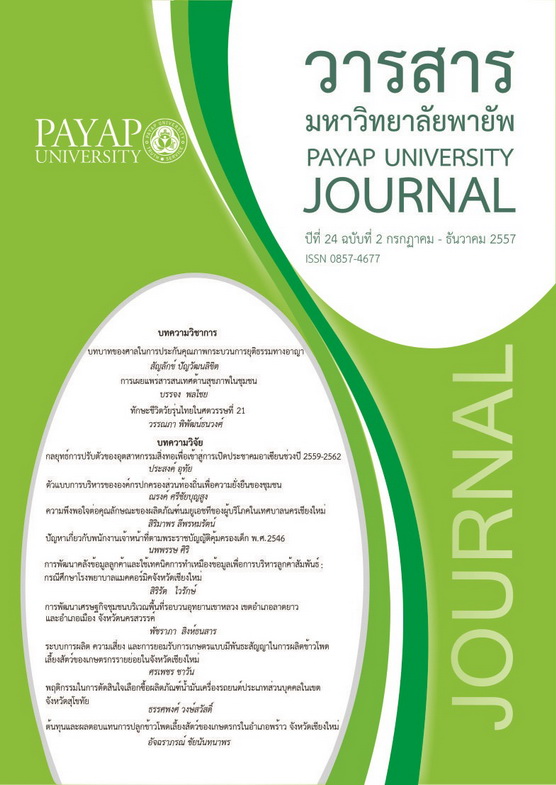ทักษะชีวิตวัยรุ่นไทยในศตวรรษที่ 21
Main Article Content
Abstract
Economic, political and social changes along with the rapid growth of technology and communication in digital world affect the behavior of individuals in social and / or professional interaction. Enhancing life skills for livelihood of people in this era especially children and youth who are the future of the nation. is needed for the appropriate development corresponding to the reality of life. This paper presents the issue entitled “Life Skills of Thai Teen in the 21st Century”. The author synthesized knowledge and conceptual paradigm of learning skills of this century from academic papers, educators, media, and the experienced people. The objective of this paper was to disseminate the knowledge regarding life skills required in teenage, and to learn an understand characteristics of behaviors across generation. This information will be useful for all parties in the society such as social worker and stakeholder who involves in teen care I term of education, nursing and public health. Paradigm shift in education and socialization of teenagers must be done to promote learning skills of future generation to survive and live meaningfully. They will be equipped with social immunity, and able to adapt themselves to the changes in technologybased society. The proper development of youth is the key to produce the quality manpower for the nation.
Article Details
References
จิราภรณ ตั้งกิตติภาภรณ์. (2556). จิตวิทยาทั่วไป. กรุงเทพฯ: สํานักพิมพ์แห่งจุฬาลงกรณ์มหาวิทยาลัย.
ทัฟ, พอล. (2557). เลี้ยงให้รุ่ง: ปฏิวัติการเรียนรู้ผ่านการสร้างลักษณะนิสัยสู่ความสําเร็จ. แปลโดย ดลพร รุจิรวงศ์ กรุงเทพฯ : โอเพ่นเวิลด์.
ทิศนา แขมมณี. (2554). ศาสตร์การสอน. กรุงเทพฯ : สํานักพิมพ์ แห่งจุฬาลงกรณ์มหาวิทยาลัย ราชบัณฑิตยสถาน.
เบลลันกา เจมส์และรอน แบรนด์. (2554). ทักษะแห่งอนาคตใหม่: การศึกษาเพื่อศตวรรษที่ 21. แปลโดย วรพจน วงศกิจรุ่งเรืองและอธิป จิตตฤกษ์). กรุงเทพฯ: โอเพ่นเวิลด์.
ยงยุทธ วงศ์ภิรมยศานติ์และสุวรรณา เรืองกาญจนเศรษฐ์. (2556). ทักษะชีวิต. สืบคนเมื่อ 12 มกราคม. 2556. https://www.teenrama.com
รัชดาวรรณ แดงสุข. (2550). การอบรมเลี้ยงดูที่ส่งผลต่อทักษะชีวิตของนักเรียนมัธยมศึกษาโรงเรียนพิบูลประชาสรรค์ เขตดินแดง กรุงเทพมหานคร. วิทยานิพนธปริญญาวิทยาศาสตรมหาบัณฑิต (จิตวิทยาพัฒนาการ) บัณฑิตวิทยาลัย มหาวิทยาลัยรามคําแหง.
สุวิชัย โกศัยยะวัฒน์. (2551). วันเด็กแหงชาติ : พัฒนาการและความสําคัญต่อการพัฒนาทรัพยากรมนุษย์. วารสารการศึกษาและพัฒนาสังคม. 4 (2);1-17
สุทัศน์ สังคะพันธ์. (2557). ทําไมต้องทักษะในศตวรรษที่ 21 บทความทักษะแหงศตวรรษที่ 21. นิสิตปริญญาเอก รุ่น 5 สาขาหลักสูตรและการสอน มหาวิทยาลัยมหาสารคาม. สืบคนเมื่อ 12 มิถุนายน 2557. https://www.srn2.go.th/attachments/article/145/รวมบทความ.pdf
เอื้อมพร เทพแจ่มใจ. (2549). ความสัมพันธระหวางหน้าที่ครอบครัวกับทักษะชีวิตเพื่อการป้องกันการเสพยาบ้าในวัยรุ่น: กรณีศึกษาศูนย์แพทย์ชุมชนวัดอินทาราม จังหวัดพระนครศรีอยุธยา รายงานวิจัย. สํานักวิทยบริการและเทคโนโลยีสารสนเทศ มหาวิทยาลัยราชภัฎอยุธยา.
Erikson, E. H. (1963). Childhood and Society. Norton, New York.
Erikson, E. H. (1968). Identity: Youth and Crisis. Norton, New York.
Freud, S. (1953). Contributions to the Psychology of Love: A special type of choice objects made by men. In E. Jones (Ed.), Collected papers (Vol. 4) (pp. 192-202).
Maslow, A. H. (1943). A Theory of Human Motivation. Psychological Review. 50, 340-396.
Stein, J. (2013). “Millennials: The Me Me Me Generation”. 2014, May15. https://time.com/247/millennials-the-me-me-me generation/
Piaget, J. (1974). Intellectual evolution for adolescence to adulthood. Human Development.19, 1-12
Wikipedia. (2013). Generation. 2013, December 20. https://en.wikipedia.org/wiki/Generation
World Health Organization. (1997). Life skills education in schools. Geneva: WHO.

